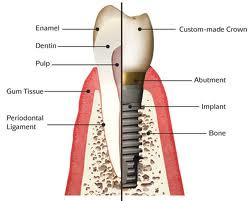This article provides a brief overview of the difference between dental implants and dentures as replacement solutions for missing teeth.
Dentures have been in use since around 700 BC. Originally, removable prosthetic teeth were made from human teeth, animal teeth or wood; more recently from porcelain or acrylic. For many years they were the only option available to those with missing teeth but they come with several drawbacks. Houston dental implants are readily available in Houston and are a relatively new method of replacing teeth that offers many benefits over dentures. Implant dentistry can provide Houston dental patients with long-term solutions to the many functional and aesthetic problems caused by having missing teeth.
The Drawbacks of Dentures

Removable dentures are prosthetic teeth that rest on the gum and which are designed to have the outward appearance and function of natural teeth. The fact that dentures have been in use for much of human history indicates that they serve a purpose, but they have certain shortcomings as well. Tooth loss causes atrophy of the bone under the gums. As the bone loses density and shrinks, it can cause dentures to fit poorly and uncomfortably over time.
Dentures that do not fit can cause the wearer problems when attempting to chew food and may also impede speech. The result of the bone deterioration is that dentures will have to be refitted at regular intervals. Aside from poor fitting, other issues with dentures include the fact that they need to be removed and cleaned regularly with denture cleaner, they can trigger the gag reflex and cause the development of painful sores in the mouth. Some shocking studies reveal that denture-wearing can shorten one’s life expectancy by 10 years as a result of malnutrition.
How Dental Implants Work

Dental implants consist of three parts: a post, an abutment and a crown. These parts work together to provide an approximation of natural teeth that is structurally closer to the real thing than any other type of tooth replacement. The post is made of titanium, an exceptionally strong and non-corrosive metal that is totally bio-compatible and readily accepted by the human body. This post serves as the foundation or anchor for the rest of the implant. Once the post is in place, the dentist will attach the abutment to it. The abutment may itself be made of titanium or of ceramic. The purpose of the abutment is to support the crown, which is the only part of the replacement tooth that is visible above the gum line. The crown is expertly fabricated in an on-site laboratory to be virtually indistinguishable from a natural tooth and is usually made of strong and durable dental ceramic.
The Benefits of Dental Implants
There is no danger of implants slipping as they are connected to the titanium post. Furthermore, they are designed to look and function like the patient's natural teeth and there is also no atrophy of the jawbone. One's ability to speak and eat is fully restored. The only maintenance needed for dental implants is regular cleaning, as is the case with natural teeth. Sometimes, crown restorations are necessary, but these are rare; it is possible for wearers to get decades of use from their implants without any problems.
For Houston residents with missing teeth, modern dentistry has provided the closest approximation to real teeth thus far in human history. The services of a dentist who specializes in implant dentistry in Houston provide a comprehensive solution to the problems that come with poorly fitted dentures.
No comments:
Post a Comment